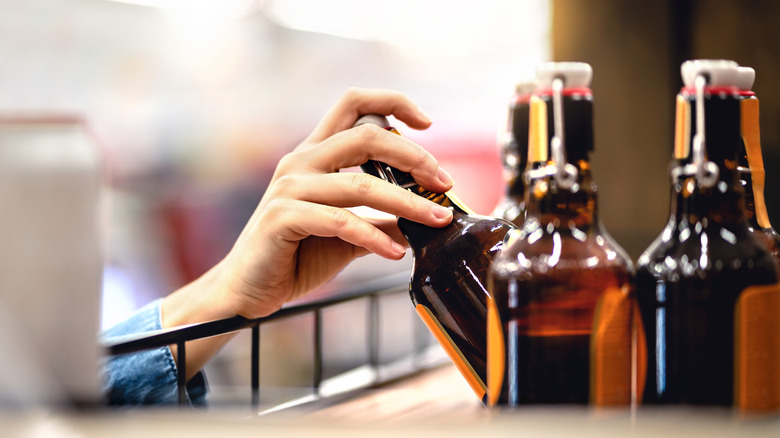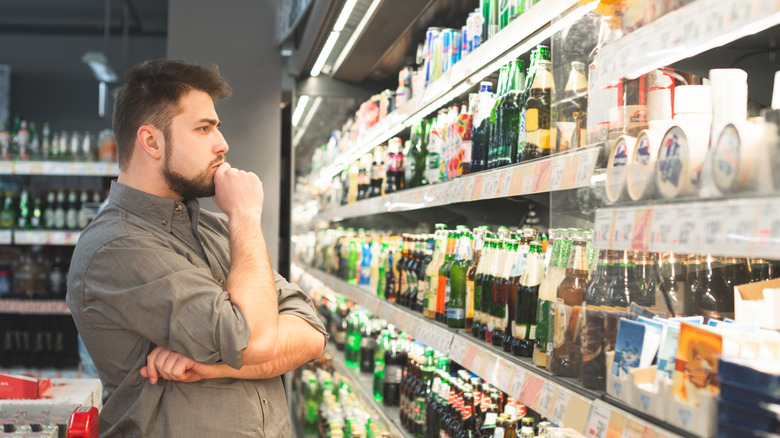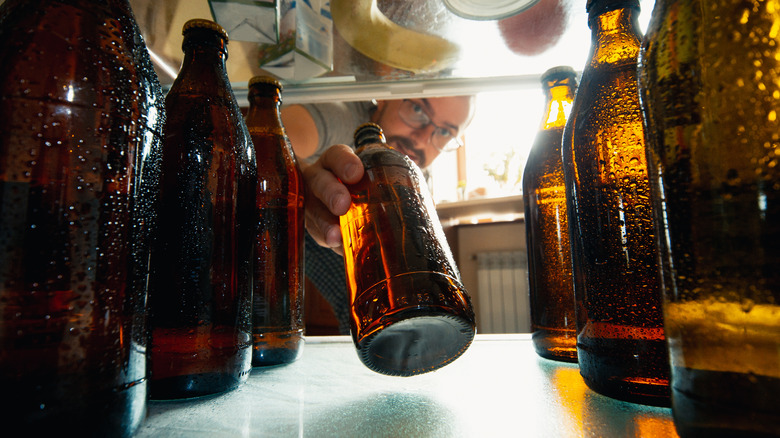Why You Should Never Buy IPAs Sitting On Store Shelves
Whether you're planning to incorporate beer into your cooking or looking to just kick back and relax with a cold one, you likely want the best quality of beer you can get. That's not to say there's no charm in affordable cans from big brands, but many beer lovers are turning to craft brews that are a little more unique. Beyond looking for brands you enjoy, the best way to choose a good beer is to pay attention to its place in a liquor or grocery store. Before you even consider buying, say, a pricier IPA, ask yourself: Is it displayed in a cooler, or is it sitting out at room temperature?
The answer can really determine whether or not you get your money's worth. Though storage temperature doesn't seem like too big a deal — unopened beer has a months-long shelf life, after all — it can make a huge difference in your IPA's flavor. Hops tend to lose their more delicate flavors when stored at warmer temperatures (anything above 40 degrees Fahrenheit), becoming more and more bitter the longer they sit outside of a cool environment. Conversely, when stored at colder temperatures, the hops' flavors and complex aromas can be better preserved.
As such, you should try to avoid buying beer that is part of a store's floor display, or placed on shelves outside of the refrigerated section. Pick up your IPAs from a cooler, and you'll be rewarded with a much better flavor.
How fresh is that grocery store beer, really?
While browsing for beer in the refrigerated section is always a good start, it's not a foolproof practice. Even if you select your next case of beer from a store's fridge, the bottles themselves may not be the freshest. Less popular or smaller-brand beers, for instance, might sit on shelves a lot longer than more popular beers, as more purchases lead to a higher turnover rate. Unsuspecting customers might end up purchasing beer that's been sitting around long enough for the flavors to decline.
For this reason, it's important to always check a beer's expiration date at the store. Naturally, the further away the date, the fresher the beer. You should also try to purchase beer (or any alcohol, for that matter) from stores that see a lot of traffic, and therefore restock often. Such stores will have fresher options than those that don't typically sell a lot of alcohol.
Unfortunately, there's no surefire way to tell how old a beer is. Sure, you might've just watched an employee restock the beer fridge, but that beer possibly came from a warm storeroom or warehouse, and there's no telling how long it sat in those conditions. However, doing your best to avoid beer that's obviously old can drastically increase your chances of buying a fresh, satisfying bottle.
Store beer properly to preserve its quality
Once a beer declines in flavor or aroma, there's really no reversing the effect, so prevention the most effective course of action. You can keep fresh beer at its best or prevent any further decline by storing it properly. You must store your brews at temperatures lower than 40 degrees Fahrenheit, so find room for beer in your fridge, instead of piling it onto a basement shelf. What's more, to avoid skunking (an unpleasant change in flavor due to light exposure), keep your beer somewhere dark.
When storing beer, you should also consider its unique traits. For instance, beers with an 8% ABV or higher will retain their quality longer than IPAs. IPAs are hop-centric, and as we said before, the flavor of hops is delicate and doesn't last long under less-than-ideal conditions.
To avoid wasting beer, try to keep IPAs and other hop-heavy beers in your kitchen fridge, or somewhere else where you'll see the bottles regularly. You won't forget about them this way, and will remember to drink them before they go off. Longer-lasting beers, on the other hand, can go in the back of the fridge or even in your basement mini-fridge, since timely consumption isn't as vital. With that being said, it's a good rule of thumb to only buy what you know you can drink within a certain timeframe.



